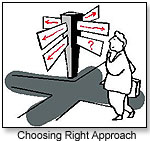 |

Tools:








Event Marketing Guru's Corner: Selling to Qualified ProspectsFive Steps Toward Successful Sales Conversions
| “You MUST know what other quotes, products, solutions or alternatives your prospect is considering.” |
Eighty percent of your competition spends exhaustive and futile time presenting to prospects that are never going to buy, yielding extremely poor "return on objectives" (ROO) by spending exhibit time inefficiently.
 Step No. 1 in effectuating a successful sales conversion is knowing whether or not your prospect is even qualified to buy. It's better to disqualify the non-buyer early than invest your time and energy presenting to prospects that are never going to buy. If you have the right solution to marketplace needs (with the right intent on your part), you must know five things in order to adequately qualify your prospect, and, in so doing, the probability of your ultimate sales conversions will skyrocket when focusing on only these A+ prospects. Step No. 1 in effectuating a successful sales conversion is knowing whether or not your prospect is even qualified to buy. It's better to disqualify the non-buyer early than invest your time and energy presenting to prospects that are never going to buy. If you have the right solution to marketplace needs (with the right intent on your part), you must know five things in order to adequately qualify your prospect, and, in so doing, the probability of your ultimate sales conversions will skyrocket when focusing on only these A+ prospects.
Start by engaging the prospect in friendly conversation, and guide the presentation with strategic questions. The idea is to get prospects talking about themselves and their current business objectives.
1. Decision Maker and Decision Process. You must be very clear on whether the prospect is the sole decision-maker. If not, you must know who else will be involved. There may be more than two that strongly influence the final decision. You also need to understand about the decision-making process. Who is ultimately in charge?
An overwhelming percentage of your competition will approach attaining this information the wrong way, with condescending questions, such as, "Are you the decision maker?" No one wants to feel as if they have zero influence over a decision after they've been appointed to attend a trade show on their company's behalf (much less have to admit it). Isn't more effective to use layering questions here, such as, "John, how do you and your team approach making these type of decisions?"
Whether or not they are the sole decision maker, it's easier to find out for certain by asking an assumptive question in advance, such as, "Who will you be discussing this decision with, John?" Always follow up with deeper probing questions to get the most detailed information possible: "That's interesting. Share with me a bit more about how you guys make these types of investments, John. It would help me in understanding, and perhaps, it very well might help me serve you better. Fair enough?"
 2. Window of Time. A major component of knowing who and how the buying process will occur is knowing the real time frame for making the final decision. After extracting this information, you need to be as clear as possible about what needs to happen next in order to maximize the acceleration of the buying cycle. Again, layering questions are the way to ascertain this information. 2. Window of Time. A major component of knowing who and how the buying process will occur is knowing the real time frame for making the final decision. After extracting this information, you need to be as clear as possible about what needs to happen next in order to maximize the acceleration of the buying cycle. Again, layering questions are the way to ascertain this information.
"John, quickly, do you and your team move on decisions of this type ... once you know it's the obvious choice and your most profitable solution?" "Great ... what do you recommend, John, as the most logical immediate next step?"
3. Your Competition. You MUST know what other quotes, products, solutions or alternatives your prospect is considering. If they have a regular supplier and are seeking other options, find out the following:
How many other quotes they're getting. "How many options of this type are you seriously considering right now, John? It would really help me share with you how we stack up."
Why they are considering other quotes. You need to know if they are simply seeking other quotes as a matter of organizational policy, prior to just going with the regular supplier. "What sort of challenges are you encountering with regard to your current solution? The more I understand your challenges, the more I can tailor our solution to address them in an optimal way."
What they are looking for in other quotes. If you know for certain that the prospect is seeking other bids, by all means, ask: "John, obviously you have some reason for feeling like you should consider other quotes, and I certainly respect your feeling this way. Would you mind if I ask you to share with me what that reason is?"
You must always demonstrate your conviction that your solution is the obvious choice, if indeed, it is. If it is not, you MUST innovate until it becomes the obvious choice by changing this inside reality. Otherwise, get into a business whereby you ARE representing the obvious choice.
What it will take to make your solution the one selected. "If you were to decide to go with our solution today, John, what would your reason be for doing so?"
4. Dominant Buying Motives. It's critical that you clearly understand your prospect's current wants and needs. You must uncover the driving factors that motivate the prospect to buy. Until you acquire this knowledge, your presentation will fall upon deaf ears, with a dull thud a majority of the time. With this knowledge, you can hone your presentation to the prospect with maximum appeal, as their hearing has suddenly and dramatically improved. "What are you looking for most, John, in a solution like this?" "What are the most important benefits you see in this solution, John? ... That's interesting. Some of our most successful and profitable clients today say the very same thing."
5. Road Blocks. You HAVE to know why they will NOT buy. Knowing this is as important as knowing why they WILL buy. "John, I appreciate your candor with me. Could I ask you to share with me the real reason you are seeking other quotes? It would help me to make sure I've given you all the information you really need about our solution." "What are some of your challenges or sore spots when it comes to utilizing solutions like this?" "Are there certain types of things you want to avoid with a solution of this type?"
These basic nuggets of information will serve to position you to invest your time more efficiently and profitably by facilitating truly qualified prospects. You'll find that your closing ratio will exponentially increase, along with a number of compliments from your accountant.
 Writer's Bio: Writer's Bio: Charles W. Allen is an independent consultant for professional event marketing solutions and specializes in sales training, motivational speaking and maximizing sponsorship sales. He also serves as executive director of the International Economic Alliance, which originated at Harvard University. Read more articles by this author
THIS BANNER IS AN AD:

• • • • • • • • • • • • • • | • • • • • • • • • • • • • • |
Back to TDmonthly's front page
|  |
Advertise on TDmonthly

|

